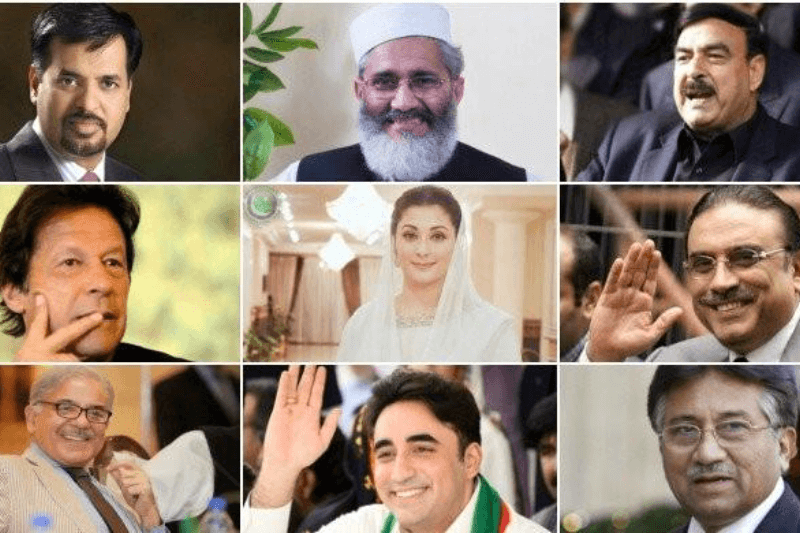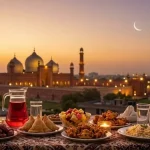
12 most famous politicians in pakistan
Since gaining independence, Pakistan has seen a succession of political leaders who have shaped its history and development. A number of them have particularly earned national and even international renown.
The following are the 12 most famous Pakistani politicians of all time.
1. Muhammad Ali Jinnah
Pakistan’s founder, Muhammad Ali Jinnah, is famous for his decisive role in the creation of the nation. He was born in Karachi on 25 December 1876 and had a brilliant legal career before entering politics. His dedication to the creation of a separate state for Muslims in British India led to the creation of Pakistan on 14 August 1947.
His leadership and diplomacy in the difficult negotiations with the British and the Indian National Congress played a crucial role in realising the dream of an independent Pakistan. After Independence, he became the first Governor General of Pakistan, until his death on 11 September 1948.
Its vision of a nation based on democracy, religious freedom and equal rights left a lasting impact. His celebrated slogan, “Unity, Faith, Discipline”, encapsulates the essence of Pakistan’s fundamental values.
Decades after his death, Muhammad Ali Jinnah remains a symbol of inspiration and leadership in Pakistan.
2. Liaquat Ali Khan
Dr Liaquat Ali Khan became the country’s first Prime Minister and a key ally of Muhammad Ali Jinnah. Born on October 1, 1895 in Karnal, British India, Liaquat played an important role in shaping the destiny of the nation after its independence in 1947.
As Prime Minister from 1947 until his tragic assassination on 16 October 1951, Liaquat Ali Khan met the challenges of post-Partition Pakistan. He focused on economic development.
The legacy of Liaquat is marked by his commitment to democratic principles, social justice and nation-building. His work to make Pakistan a progressive and sovereign state contributed to his fame. He was tragically assassinated at a public event in Rawalpindi, leaving a mysterious impact on the history of the nation.
3. Imran Khan
Former cricketer turned politician Imran Khan was born in Lahore, Pakistan, on 5 October 1952. He left a lasting legacy in the history of his country. Known for his outstanding cricketing career, Khan led the Pakistan cricket team to its historic World Cup triumph in 1992.
In 1996, Imran Khan founded the Pakistan Tehreek-e-Insaf (PTI) with the aim of eliminating corruption and improving Pakistan’s socio-economic conditions. Imran Khan, after years of perseverance, achieved his political breakthrough by becoming Prime Minister of Pakistan in August 2018.
The tenure of Imran Khan has been marked by initiatives focusing on education, health and the fight against corruption. But his leadership has also faced challenges, with a polarised political landscape and economic complexities.
4. Sheikh Mujibur Rahman
Born on 17 March 1920 in Tungipara, British India (now Bangladesh), Sheikh Mujibur Rahman is an emblematic figure in the struggle for Bangladeshi independence. Known as the “father of the nation”, Sheikh Mujib played an essential role in the quest for autonomy in East Pakistan, which finally gained its independence in 1971.
A inspirational and charismatic leader, Mujib founded the Awami League in 1949, defending the rights of Bengali speakers in a united Pakistan. The struggle for linguistic and cultural rights, however, evolved into a broader movement.
5. Abdul Wali Khan
Born on 11 January 1917 in Utmanzai, British India (now Pakistan), Abdul Wali Khan is a prominent political leader in the history of Pashtun nationalism.
He played an important role in Pakistani politics, defending the rights of the Pashtun community and emphasising regional autonomy. He was leader of the Awami National Party (ANP).
The influence of Abdul Wali Khan continues as a symbol of Pashtun resilience and a defender of the rights of minority communities in Pakistan.
6. Zulfikar Ali Bhutto
Born on 5 January 1928, Zulfikar Ali Bhutto is a charismatic and influential Pakistani politician who has left an indelible mark on the country’s history. Bhutto was Prime Minister from 1973 to 1977 and was the founder of the Pakistan People’s Party (PPP).
His political career was turbulent, marked by allegations of electoral fraud and authoritarian tendencies. Eventually her government was overthrown by a military coup in 1977, leading to her arrest and execution in 1979.
The legacy of Zulfikar Ali Bhutto is complex. Although he is remembered as a visionary leader who sought to empower the masses, he is also remembered as a controversial figure because of the political turmoil that marked his reign. The influence of Bhutto also persists through the political legacy of the Pakistan People’s Party.
7. Benazir Bhutto
Born on 21 June 1953 in Karachi, Pakistan, Benazir Bhutto made history by becoming the first woman to lead a Muslim-majority nation. The Daughter of Zulfikar Ali Bhutto, she inherited a legacy deeply rooted in Pakistani politics. She served two non-consecutive terms as Prime Minister of Pakistan, first from 1988 to 1990 and then from 1993 to 1996.
Renowned for her outspokenness and resilience, she worked to advance women’s rights, promote education and address economic challenges. She led the charge to modernise Pakistan and bridge the gap between urban and rural communities.
Benazir Bhutto remained a symbol of hope for many, even in the face of political obstacles such as accusations of corruption. Her life was tragically cut short when she was assassinated during an election rally in 2007.
8. Mian Nawaz Sharif
Born on December 25, 1949 in Lahore, Pakistan, he served as Prime Minister of Pakistan for three non-consecutive terms – from 1990 to 1993, from 1997 to 1999 and from 2013 to 2017.
Sharif’s focus during his tenure was on economic development, infrastructure projects and privatisation initiatives. The aim of his government was to strengthen Pakistan’s economy and improve the standard of living of its citizens. His leadership, however, faced challenges, including military interventions and allegations of corruption.
Having endured political controversy and periods of exile, Nawaz Sharif remains a leading figure in Pakistan. Sharif is in fact famous for his efforts to modernise Pakistan.
9. Asif Ali Zardari
Born on 26 July 1955 in Karachi, Pakistan, Asif Ali Zardari is a Pakistani politician, known for his long political career and his role as the 11th President of Pakistan. President Zardari took office in 2008, following the assassination of his wife, Benazir Bhutto.
During his term in office, Zardari has faced challenges, including economic and security issues. At the same time, however, he has pursued initiatives aimed at strengthening democratic institutions and promoting social well-being.
He is famous in Pakistan for his resilience in the face of political adversity and his contributions to the democratic process.
10. Shehbaz Sharif
Shehbaz Sharif is an important player in Pakistani politics, known for his long-standing dedication to the country. He was born in Lahore, Pakistan, on 23 September 1951. Through the important positions he has held, including Chief Minister of Punjab and Prime Minister of Pakistan, Shehbaz Sharif has had a significant impact on the nation’s political climate.
A key feature of his leadership has been his focus on public welfare projects, including initiatives in the areas of health, education and employment.
11. Bilawal Bhutto Zardari
Pakistan’s leading political figure and heir to the Bhutto family, Bilawal Bhutto Zardari was born on 21 September 1988. Following in the footsteps of his mother Benazir Bhutto and grandfather Zulfikar Ali Bhutto, he is the third generation of his family to enter politics at the head of the Pakistan People’s Party (PPP).
He entered politics with a determination to continue his family’s legacy by defending democratic values and social justice. Although still a young man, he represented Pakistan as its 37th foreign minister and helped to resolve its most pressing problems.
12. Maryam Nawaz
The daughter of former Prime Minister Nawaz Sharif, Maryam Nawaz is a politician. Born on 28 October 1973 in Lahore, Pakistan. She also represented her father’s political party, the Pakistan Muslim League-Nawaz (PML-N), and played a role in Pakistan’s political landscape.
Nawaz came to prominence because of her association with the powerful Sharif political family. She has played an active role in the party over the years, emphasising her leadership qualities and her commitment to the party’s ideology.



